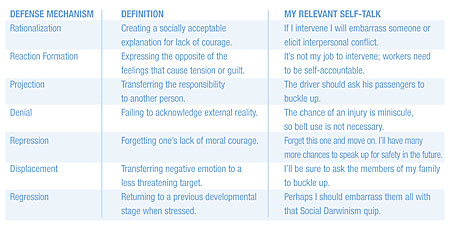

“Why didn’t I say something?”
On a rainy Tuesday morning in Atlanta, I climbed in the back of a hotel van destined for the headquarters of Cox Enterprises. I was looking forward to giving a keynote address at the company’s annual safety conference. As in many public vehicles, the safety belt was a bit inconvenient to locate and use, but of course I mindfully buckled up. From my vantage point, I noticed only the driver was using his safety belt. The front-seat passenger and three occupants on the seat in front of me were not buckled up. Should I say something?
The van did not move for at least two more minutes, giving me plenty of time to speak up. But what should I say? I didn’t know any of these people, and I didn’t want to insult anyone. We were on our way to a safety conference, making it even more likely I would offend someone if I drew attention to their at-risk behavior. “I know,” I said to myself, “I’ll use this event in my presentation to point out the need to be mindful rather then mindless about simple harm-prevention behaviors like safety-belt use. But then I would be admitting my own lack of courage to offer a simple buckle-up reminder.
How could a keynote speaker for a safety conference be such a wimp?”
There I was, making excuses for not intervening on behalf of transportation safety. And safety-belt use was the first target of my safety-related intervention research 30 years ago, which evolved into behavior-based safety (BBS). Suddenly it occurred to me the van driver was the designated leader in this situation. He should ask everyone to buckle up.
Here’s another thought: It’s really each individual’s personal choice to be safe or at-risk. People need to be self-accountable for their own safety. “Besides,” I thought to myself with a smile, “If you believe in Social Darwinism, people who don’t buckle up shouldn’t.”
Psychoanalysis of defensive thinking
Let’s analyze my self-talk in terms of the specific defense mechanisms psychotherapists presume we all use to protect our ego or self-esteem. Consider Dr. Sigmund Freud’s well-known theory of personality. Freud believed our personality consists of the id, ego and superego, each corresponding respectively to desire, reason and conscience.The id follows the pleasure principle and wants immediate gratification, while the ego operates in accordance with the reality principle, taking into consideration the external consequences of behavior so as to maximize pleasure and minimize pain. The superego represents our personal values or morals, and is concerned with doing what’s right as defined by the norms or mores of a specific society.

Psychoanalysis of safety
In safety terms, at-risk behavior follows the pleasure principle. Such behavior is usually more convenient, more comfortable and sometimes stimulating or exciting.Following safety rules and coaching others to practice safe behavior reflects directives from our superego. In the example above, my superego or conscience told me to remind the van passengers to buckle up, but my pleasure-driven id advised me: relax, enjoy the moment, and don’t make waves. My defensive self-talk protected my ego from dealing with conflicting pressure from my superego, thus preventing stress, tension or guilt — at least for the short term.
Later, however, I felt disappointment for not showing appropriate moral courage in that situation. After-the-fact reflection and self-talk does not activate id impulses nor threaten my ego because the reality of that event is long gone. And we all got to our destination safely — no harm done. Does this consequence reinforce my use of defensive self-talk to stifle moral courage in the future, or will this unrestrained pondering of my superego strengthen my resolve to speak up for safety next time?
Back to reality
The seven defense mechanisms listed in the sidebar above represent certain types of self-talk I used to justify my lack of courage in the van. Have any of these seven defense mechanisms held you back from showing the moral courage expected of a safety leader?Rationalizationor intellectualization is the most well-known defense mechanism. Whenever we conjure up a socially acceptable reason for not following our morals or conscience, we are rationalizing.
Our defensive self-talk reflectsreaction formation when it asserts an opposing viewpoint, as with the excuse, “Coaching others for safety is undesirable because it stifles the development of self-accountability.”
But when we transfer a safety-coaching responsibility to another person, like to a supervisor or safety professional, we are practicingprojection.
Denialoccurs whenever we look the other way after observing at-risk behavior; perhaps telling ourselves the chance of an injury is miniscule.
Denial is easier, of course, when werepresspersonal stories of other people getting hurt under similar circumstances.
Or we might defend our self-concept bydisplacingour safety coaching to a less intimidating target and context, as when reminding a family member to follow a particular safety rule.
Some passionate safety pros “lose their cool” when observing at-risk behaviors and initiate an adult-child confrontation. Such an encounter reflectsregressionbecause it exemplifies an earlier chronological age (such as a childhood temper tantrum) or a former level of personal development (before learning the essence of interpersonal leadership and relationship-building).
Will this insight into how we talk ourselves out of actively caring for safety increase our moral courage to step to the plate for safety? I’d love to receive personal answers to this pivotal question.
